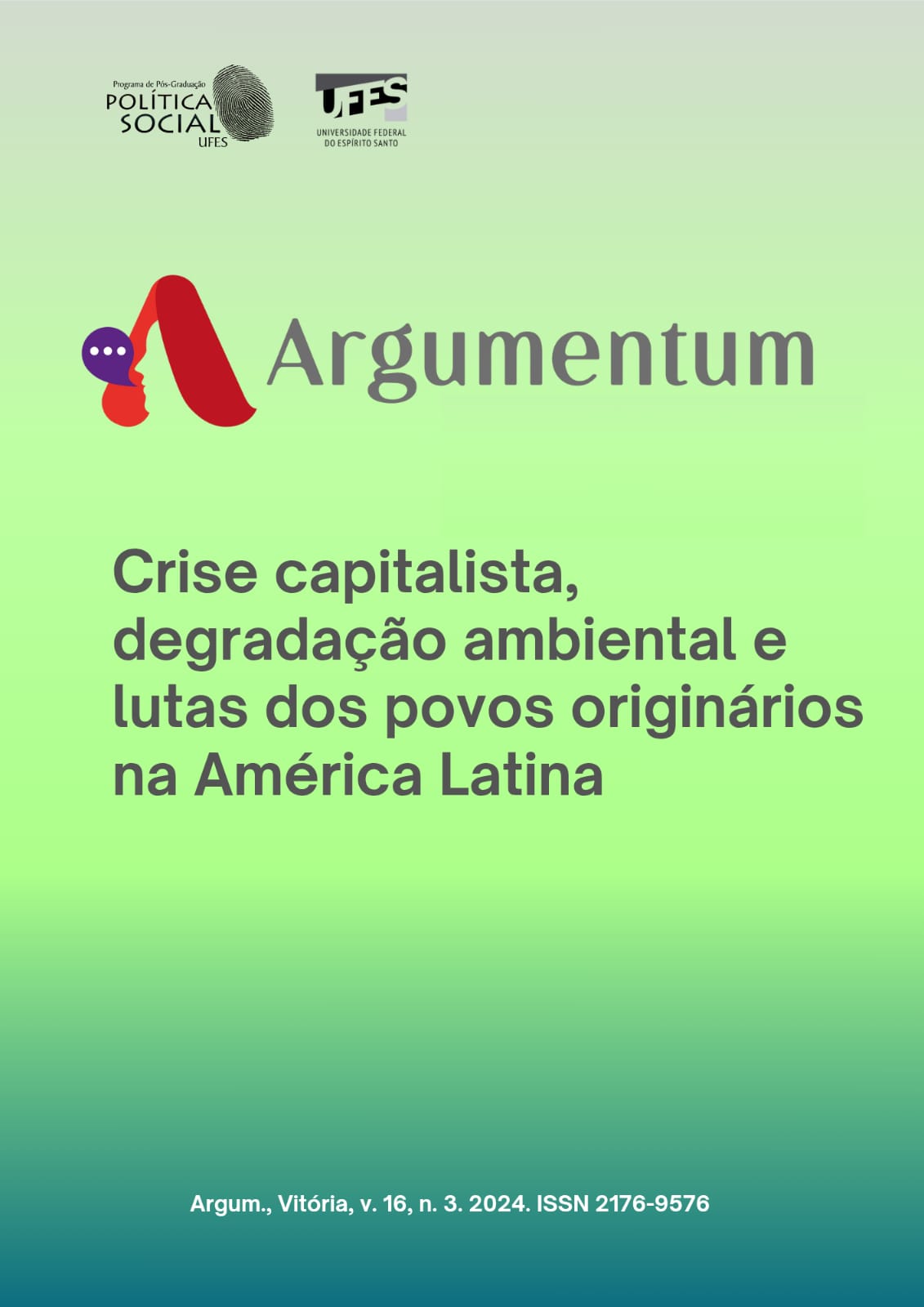Expropriation and socio-economic development in indigenous territories
DOI:
https://doi.org/10.47456/argumentum.v16i3.43918Keywords:
Indigenous Peoples, Agribusiness, Social ProtectionAbstract
This article is the result of Master's research entitled "Expanded social protection, ethnoknowledge, and agribusiness: a study in the Potiguara indigenous territory of Paraíba". It analyses the lack of social protection in indigenous territories and its relationship with the precepts of capitalist socioeconomic development in view of the social-democratic role of the Brazilian State and the implications arising from the advance of agribusiness in the Potiguara indigenous reserve of Paraíba. The guiding questions, addressed in the light of dialectical historical materialism and employing bibliographic and documentary research of a qualitative nature, are as follows: are native peoples recognised as subjects of law by the Brazilian State? Does agribusiness generate social (dis)protection? What is the relationship between agribusiness and expropriation? The results identify that social protection, as the core that sustains the relationship between the State and indigenous society, is superficial and fragile, and that the practice of agribusiness produces ethno-genocidal scenarios in indigenous territories and has both material and immaterial impacts on access to and maintenance of ancestral territories and cultures.
Downloads
References
Associação Nacional de Ação Indigenista. Tabela Terras Indígenas. Salvador, [2023?]. Disponível em: https://anaind.org.br/tabela/. Acesso em: 16 nov. 2023.
Bastian, L. et al. A questão indígena e a flexibilização de direitos no brasil: ameaças legislativas em um contexto de fragilização política. Rio de Janeiro: Instituto de Pesquisa Econômica Aplicada, abr. 2023. (Texto para Discussão, 2868). Disponível em: TD_2868_web.pdf (ipea.gov.br). Acesso em: 10 nov. 2023
Brasil. Lei n. 6001, de 19 de dezembro de 1973. Dispõe sobre o Estatuto do Índio. Brasília (DF), 1973.
Brasil. (Constituição 1988). Constituição da República Federativa do Brasil de 1988. Brasília (DF): Senado Federal, 1988.
Dados do Censo 2022 revelam que o Brasil tem 1,7 milhão de indígenas. Notícias, Brasília (DF): Ministério dos Povos Indígenas, Fundação Nacional dos Povos Indígenas 7 ago. 2023. Disponível em: Dados do Censo 2022 revelam que o Brasil tem 1,7 milhão de indígenas — Fundação Nacional dos Povos Indígenas (www.gov.br). Acesso em: 14 nov. 2023.
Brasil. Lei n. 9.394, de 20 de dezembro de 1996. Lei de Diretrizes e Bases da Educação Nacional. Brasília (DF), 1996.
Brasil. Ministério da Saúde. Secretaria de Saúde Indígena. Relatório Situacional do Distrito Sanitário Especial de Saúde Indígena Potiguara: Anexo IV. Brasília (DF): Ministério da Saúde, 2023. Disponível em: anexo-vi-relatorio-situacional-dsei-potiguara.pdf (www.gov.br). Acesso em: 10 nov. 2023.
Cardoso, T. M.; Guimarães, G. C. (Orgs). Etnomapeamento dos Potiguara da Paraíba. Brasília (DF): FUNAI/CGMT/CGETNO/CGGAM, 2012. (Séria Experiências Indígenas, n. 2).
Comissão Econômica para a América Latina e o Caribe. Os Povos Indígenas na América Latina: avanços na última década e desafios pendentes para a garantia de seus direitos. Santiago de Chile: CEPAL, fev. 2015. Disponível em: Los pueblos indígenas en América Latina. Avances en el último decenio y retos pendientes para la garantía de sus derechos. Síntesis | CEPAL. Acesso em: 12 nov. 2023.
Fahs, A. C. S.; Chagas, I. Movimento Indígena: história e principais objetivos. Politize, 8 ago. 2016. Disponível em: Movimento Indígena: história e principais objetivos! | Politize! Acesso em: 10 set. 2023.
¬Lima, T. C. S. de; Mioto, R. C. T. Procedimentos metodológicos na construção do conhecimento científico: a pesquisa bibliográfica. Revista Katálysis, v. 10, n. especial-Pesquisa em Serviço Social, p. 37–45, 2007.
Marx, K. O capital: crítica da economia política: livro I: o processo de produção do capital. Tradução Rubens Endrele. 3. ed. São Paulo: Boitempo, 2023.
Medici, R. Gramsci e o Estado: para uma releitura do problema. Rev. Sociol. Polít., Curitiba, n. 29, p. 31-43, nov. 2007.
Pereira Filho, P. S. A atuação e contribuição dos movimentos indígenas no processo de redemocratização brasileira: uma análise da assembleia nacional constituinte (1987). 2023. Dissertação (Mestrado em Serviço Social)-Escola de Serviço Social da Universidade Federal do Rio de Janeiro, Rio de Janeiro, 2023.
Silva, E. L. P. da. Sentidos territoriais da proteção social no litoral norte da Paraíba. Revista de Políticas Públicas, São Luís, v. 22, p. 1641–1664, 27 set. 2018. Disponível em: https://cajapio.ufma.br/index.php/rppublica/article/view/9884. Acesso em: 9 set. 2024.
Souza Filho, R. de S.; Gurgel, C. Gestão democrática e serviço social: princípios e propostas para a intervenção crítica. ¬São Paulo: Cortez, 2016. (Coleção biblioteca básica de serviço social, v. 7).
Sposati, A. Modelo brasileiro De Proteção social não contributiva: concepções fundantes. In: Concepção e gestão da proteção social não contributiva no brasil. Brasília (DF): Ministério do Desenvolvimento Social e Combate à Fome, UNESCO, 2009.
Published
How to Cite
Issue
Section
License
Copyright (c) 2024 Argumentum

This work is licensed under a Creative Commons Attribution 4.0 International License.
Copyright Transfer Agreement
As a condition for submission, the authors must agree with the Copyright Transfer Agreement, by checking the box after reading the clauses.
The author(s) (hereinafter "AUTHOR") hereby agrees to transfer, without any financial compensation, the property of copyrights regarding Argumentum, a journal of the Postgraduate Program in Social Politics (Programa de Pós-graduação em Política Social), Federal University of Espírito Santo (Universidade Federal do Espírito Santo) - Av. Fernando Ferrari, 514 - Goiabeiras 29075-910, Vitória (Brazil), (hereinafter "ARGUMENTUM"), according to the following terms and conditions:
1. I am aware of the terms of "Care Ethics Research Guide" described in the Policies section.
2. AUTHOR warrants to be the writer and copyright holder of the WORK submitted.
3. AUTHOR declares that the WORK does not infringe the rights of third-parties; that the distribution of images (if existent) was authorized; and that AUTHOR assumes total moral and property responsibility for their content.
4. AUTHOR agrees to transfer all the copyrights concerning the WORK to ARGUMENTUM, especially the rights to edit, publish, translate into another language, and reproduce it through any process or technique. ARGUMENTUM becomes the exclusive owner of the rights regarding the WORK, and any total or partial reproduction, in any other medium, printed or electronic, is strictly forbidden without prior written consent by ARGUMENTUM.
5. The copyright transfer is unpaid and, therefore, there will be no monetary compensation whatsoever by ARGUMENTUM in order to use the TEXT.

